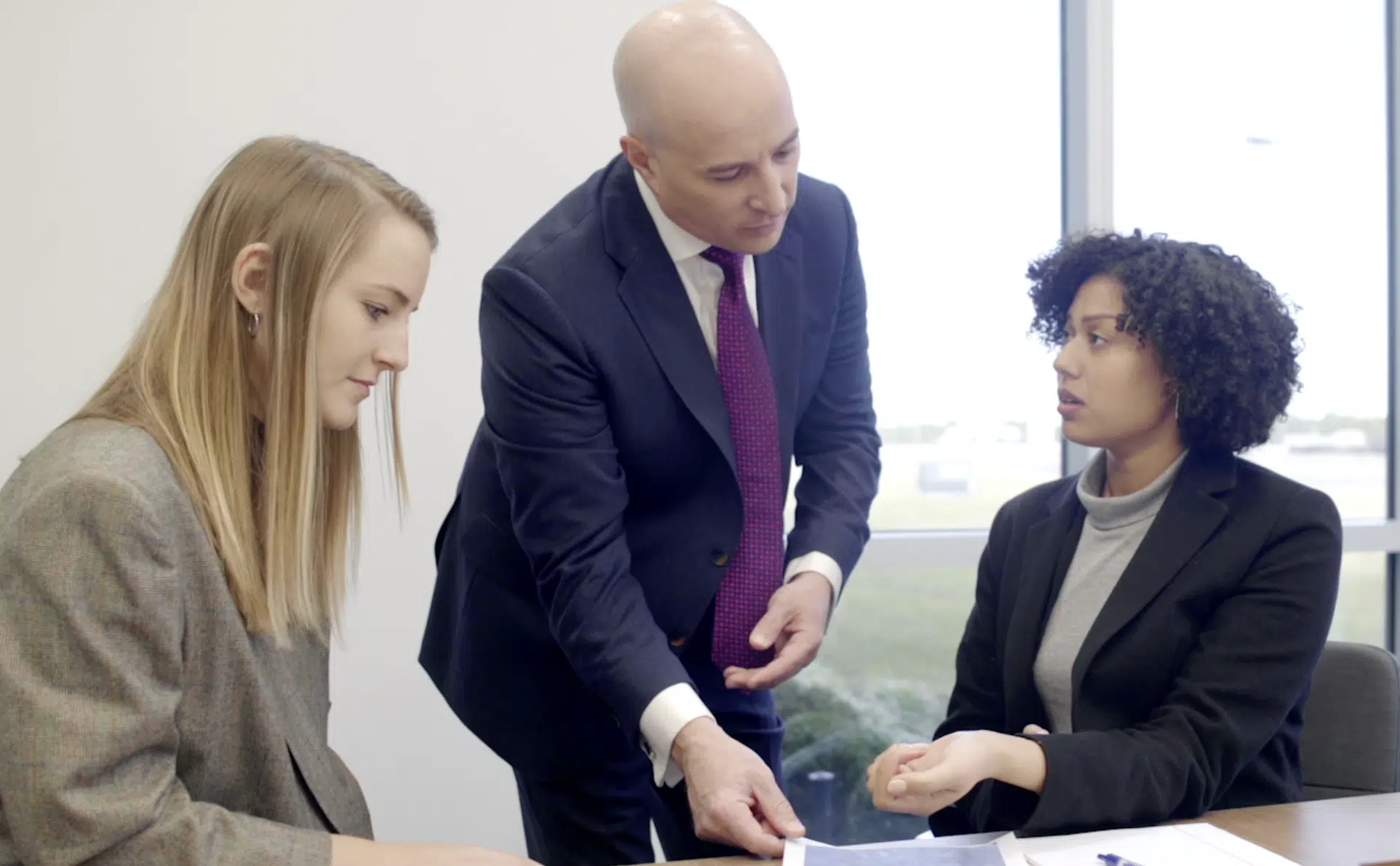
If you’ve been injured due to someone else’s negligence, one of the most important steps you can take is to hire a qualified New York City personal injury attorney. Your initial consultation with a potential attorney is crucial, as it gives you the opportunity to assess whether they are the right fit for your case.
To make the most of this meeting, it’s essential to come prepared with a list of questions that will help you evaluate the attorney’s experience, communication style, and approach to handling your case.
Table of Contents
- 10 Questions for Your Personal Injury Lawyer
- Documents and Other Information to Bring to Your First Meeting with a Lawyer
- Contact a Personal Injury Lawyer Today for a Free Consultation
10 Questions for Your Personal Injury Lawyer
Here are some questions you may want to ask your lawyer at your first meeting:
1. What experience do you have with cases similar to mine?
When meeting with a potential personal injury attorney, it’s crucial to inquire about their experience handling cases similar to yours. Personal injury law encompasses a wide range of case types, such as car accidents, slip and falls, medical malpractice, and product liability. Each type of case requires specific knowledge. An attorney who has successfully handled cases like yours in the past will be better equipped to navigate the legal challenges and develop an effective strategy for your case.
Ask the attorney about their track record with cases similar to yours. How many cases have they handled? What were the outcomes of those cases? An experienced attorney should be able to provide you with specific examples of successful settlements or verdicts they have obtained for clients in situations comparable to yours.
2. Who will be working on my case?
During your initial consultation, ask the attorney who will be directly involved in handling your case. In some law firms, the attorney you meet with during the consultation may not be primarily responsible for your case. It’s essential to know who will be your main point of contact and who will be working on the various aspects of your case.
Inquire about the roles and responsibilities of each team member involved in your case. Will there be paralegals, junior associates, or other support staff assisting with your case? Understanding the structure of the legal team can help you set expectations for communication and case management.
3. How do you communicate with clients?
Effective communication is key to a successful attorney-client relationship. During your initial meeting, ask the attorney about their communication practices. How often can you expect to receive updates on your case? What is their preferred method of communication (e.g., phone calls, emails, in-person meetings)?
It’s also essential to discuss the attorney’s availability and responsiveness. Will they be accessible when you have questions or concerns? How quickly can you expect a response to your inquiries? A good attorney should be committed to keeping you informed and promptly addressing your concerns throughout the legal process.
4. What is your assessment of my case?
During your initial consultation, provide the attorney with a detailed account of your accident and injuries. Share any relevant documentation, such as police reports, medical records, and witness statements. After reviewing this information, ask the attorney for their preliminary assessment of your case.
A knowledgeable attorney should be able to provide you with a realistic evaluation of the strengths and weaknesses of your case. They should discuss the potential challenges you may face and the strategies they would employ to overcome them. Be wary of attorneys who make grandiose promises or guarantee specific outcomes, as every case is unique and subject to various factors.
5. What is your approach to handling personal injury cases?
Ask the attorney about their general approach to handling personal injury cases. Do they prioritize settlement negotiations, or are they prepared to take your case to trial if necessary? A skilled attorney should be adept at both negotiating favorable settlements and advocating for their clients in court.
Inquire about the attorney’s philosophy on client involvement. Do they encourage clients to take an active role in decision-making, or do they prefer to handle most aspects of the case independently? Finding an attorney whose approach aligns with your preferences and expectations is important.
6. What is the timeline for my case?
Personal injury cases can vary in duration, depending on factors such as the complexity of the case, the severity of your injuries, and the willingness of the opposing party to negotiate. During your initial meeting, ask the attorney for a general timeline of what you can expect as your case progresses.
While an attorney cannot provide an exact timeline, they should be able to offer a rough estimate based on their experience with similar cases. They should also discuss the factors that may impact the duration of your case, such as the time required for medical treatment, the discovery process, and potential delays in the court system.
7. What are the potential outcomes of my case?
Ask the attorney about the potential outcomes of your case. What types of compensation may be available to you, such as medical expenses, lost wages, pain and suffering, and property damage? A knowledgeable attorney should be able to provide a range of potential outcomes based on the specific circumstances of your case.
It’s important to have a realistic understanding of the potential value of your case. While an attorney cannot guarantee a specific outcome, they should be able to discuss the factors that may influence the value of your claim, such as the severity of your injuries, the extent of your economic losses, and the strength of the evidence supporting your case.
8. How do you handle fees and costs?
Personal injury attorneys typically work on a contingency fee basis, meaning they only receive payment if they successfully recover compensation on your behalf. During your initial consultation, ask the attorney about their fee structure and any potential costs associated with your case.
Inquire about the percentage of the settlement or award the attorney will receive as their fee. Ask about any additional costs you may be responsible for, such as court filing fees, expert witness fees, or investigation expenses. A transparent attorney should be upfront about their fees and costs and provide you with a clear explanation of how they will be handled.
9. What is my role in the legal process?
As the client, you play a crucial role in the success of your personal injury case. During your initial meeting, ask the attorney about your responsibilities and how you can contribute to a positive outcome.
The attorney should discuss the importance of following their advice, attending medical appointments, and providing any requested documentation promptly. They may also advise you on how to handle communication with insurance companies and other parties involved in your case.
10. What are the next steps?
Before concluding your initial consultation, ask the attorney about the next steps in the legal process. If you decide to hire the attorney, what can you expect in the coming weeks and months?
The attorney should provide you with a clear outline of the actions they will take on your behalf, such as conducting an investigation, gathering evidence, and filing necessary paperwork. They should also discuss any actions you need to take, such as providing additional documentation or attending legal proceedings.
Documents and Other Information to Bring to Your First Meeting with a Lawyer
In addition to preparing questions for your initial consultation with a personal injury attorney, gathering relevant documents and information is essential to make the most of your meeting. By providing your attorney with a comprehensive overview of your case, you can help them better assess your situation and develop an effective strategy. Here are some key documents and information to collect before your first meeting:
Police reports and accident reports.
If your personal injury case involves a car accident or any incident that required police intervention, there is an official police report or accident report. These reports often contain valuable information, such as the date, time, and location of the incident, the parties involved, and any initial observations made by law enforcement. If you have a copy of the report, provide it to the attorney.
Medical records and bills
Your attorney will gather all medical records related to the injuries you sustained in the accident. This includes emergency room records, hospital stays, surgical reports, diagnostic test results, and treatment plans. Additionally, collect any medical bills you have received, including those from ambulance services, hospitals, doctors, physical therapists, and other healthcare providers. These documents will help your attorney understand the extent of your injuries and the financial impact they have had on your life.
Insurance information
Provide your attorney with information about your insurance coverage, as well as the insurance details of any other parties involved in the accident. This includes your health insurance, auto insurance (if applicable), and any other relevant policies. If you have correspondence from insurance companies, such as letters or emails, bring those to your meeting as well.
Witness information
If there were witnesses to your accident, gather their names, contact information, and any statements they may have provided. Witness testimony can be crucial in supporting your case, and your attorney may want to reach out to them for further information.
Lost wage documentation
If your injuries have caused you to miss work, gather documentation that demonstrates your lost income. This may include pay stubs, tax returns, or a letter from your employer confirming your absence and the amount of wages or income you have lost.
Photographs and videos
If you have any photographs or videos related to your accident or injuries, bring them to your initial consultation. This may include pictures of the accident scene, property damage, visible injuries, or any other relevant visual evidence. These materials can help your attorney better understand the circumstances of your case and the extent of your damages.
Personal notes and journal entries
Consider keeping a personal journal or notes documenting your recovery process, pain levels, and the impact your injuries have had on your daily life. This information can be valuable in communicating the non-economic damages you have suffered, such as pain and suffering, emotional distress, and loss of enjoyment of life.
Correspondence with the other party or their insurance company
If you have communicated with the other party involved in your accident or their insurance company, bring copies of these conversations to your meeting. This may include letters, emails, or notes from phone calls. Your attorney will want to review this correspondence to ensure your rights are protected and to advise you on how to handle future communication.
A timeline of events
To help your attorney understand the sequence of events related to your case, prepare a timeline that outlines the key dates and details. This should include the date of the accident, dates of medical treatments, and any other significant milestones in your recovery process.
Contact a Personal Injury Lawyer Today for a Free Consultation
Taking the time to prepare for your initial consultation with a personal injury attorney is a crucial step in ensuring the success of your case. By gathering relevant documents, such as police reports, medical records, and insurance information, you can provide your attorney with a comprehensive overview of your situation. This preparation allows your attorney to assess your case better and develop an effective strategy for pursuing the compensation you deserve.
In addition to collecting important documents, it’s essential to come prepared with a list of questions to help you evaluate the attorney’s experience, communication style, and approach to handling your case. Ask about their track record with cases similar to yours, their assessment of your case, and their strategy for achieving a favorable outcome. By engaging in an open and honest dialogue with your potential attorney, you can make an informed decision about whether they are the right fit for your needs.
At The Rothenberg Law Firm LLP, we understand the challenges and uncertainties of pursuing a personal injury claim. With over 50 years of experience, billions won and collected, and a proven track record of success, our attorneys are dedicated to providing compassionate, personalized representation to every client. We take the time to listen to your story, answer your questions, and guide you through every step of the legal process.
If you or a loved one has been injured due to someone else’s negligence, don’t wait to seek the legal support you need. Contact The Rothenberg Law Firm Accident and Injury Lawyers today for your free, no-obligation consultation. Our experienced personal injury attorneys are ready to fight for your rights and help you pursue the compensation you deserve. Let us put our knowledge, skills, and resources to work for you and your family. Contact us now at 800-624-8888 or through our online form to get started on your path to recovery.





